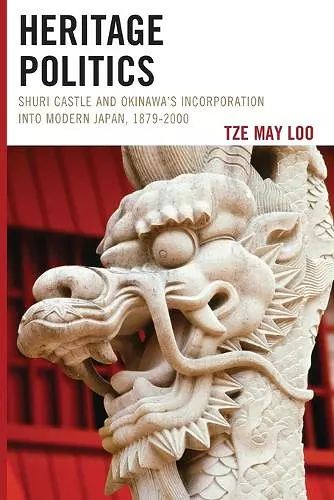Heritage Politics
Shuri Castle and Okinawa’s Incorporation into Modern Japan, 1879–2000
Format:Paperback
Publisher:Bloomsbury Publishing PLC
Published:20th Jul '17
Currently unavailable, and unfortunately no date known when it will be back
This paperback is available in another edition too:
- Hardback£102.00was £102.00(9780739182482)

Heritage Politics: Shuri Castle and Okinawa's Incorporation into Modern Japan, 1879–2000 is a study of Okinawa’s incorporation into a subordinate position in the Japanese nation-state, and the role that cultural heritage, especially Okinawa’s iconic Shuri Castle, plays in creating, maintaining, and negotiating that position. Tze May Loo argues that Okinawa’s cultural heritage has been – and continues to be – an important tool with which the Japanese state and its agents, the United States during its 27-year rule of the islands (1945–1972), and the Okinawan people articulated and negotiated Okinawa’s relationship with the Japanese nation state. For these three groups, Okinawa’s cultural heritage was a powerful way to utilize the symbolism of material objects to manage and represent the islands’ cultural past for their own political aims. The Japanese state, its agents, and American authorities have all sought to use Okinawa’s cultural heritage to control, discipline, and subordinate Okinawa. For Okinawans, their cultural heritage gave them a powerful way to resist Japanese and American rule, and to negotiate for a more equitable position for themselves. At the same time, however, this book finds that Okinawan strategies to deploy their cultural heritage politically are deeply intertwined with, and to a significant extent enabled by, precisely these Japanese and American attempts to govern Okinawa through its heritage. This examination of the political role of Okinawa’s cultural heritage is a window into a wider process of how nation-states and other political formations make themselves thinkable to the people they rule, how the ruled seek out spaces to make claims of their own, and how cultural pasts, once made usable, are implicated in these processes.
Heritage Politics is worth the time to read. * The Journal of Japanese Studies *
Heritage Politics: Shuri Castle and Okinawa’s Incorporation into Modern Japan, 1879-2000 is a powerful critical examination of the central lieu de mémoire in Okinawa, and—as Loo persuasively argues—one more broadly important to Japan itself: Shuri Castle. Her study is more than a survey of the transformation of the structure over time, with its successive destructions and reconstructions, although her narrative does address that through a meticulous examination of the fragmentary primary materials that survived the Pacific War. The castle becomes the occasion for a complex and nuanced exploration of the social and political transformation of the Okinawan people following the islands’ incorporation into the modern Japanese state at the close of the 19th Century. Shuri first comes to stand for the disestablished monarchy, as it is erased it from popular discourses and falls into near total ruin. At the same time, it is subject to fascinating appropriations by colonial bureaucrats, mainland academics and local activists, who figure it variously as a sign of a common Japanese and Okinawan heritage, a marker of uneven development, and an index of local subordination to central authority. Most interestingly, it becomes a powerful ritual space in an emerging Japanese imperial ideology, a site that authorizes the articulation of local notions of filial piety and obeisance with a newly-constructed doctrine of absolute and unquestioning loyalty to the emperor of Japan. Loo provides a brilliant critique of this ideology in a detailed study of its material and practical underpinnings, exposing complex and ambiguous dimensions of colonial rule, local accommodation and resistance. -- Christopher Nelson, University of North Carolina
Heritage Politics provides a deeply researched and nuanced account of the transformations undergone by Shuri Castle as an iconic site of struggle over Okinawan and Japanese identity. Tze May Loo compellingly demonstrates the necessity of joining close analysis of material culture with critical interrogation of colonialism and imperialism in both the prewar and postwar periods. Her work thus represents an important contribution to multiple fields, including art and architectural history, cultural policy and heritage studies, Asian intellectual and political history, and colonial studies. -- Noriko Aso, University of California, Santa Cruz
ISBN: 9781498550536
Dimensions: 231mm x 149mm x 18mm
Weight: 340g
222 pages